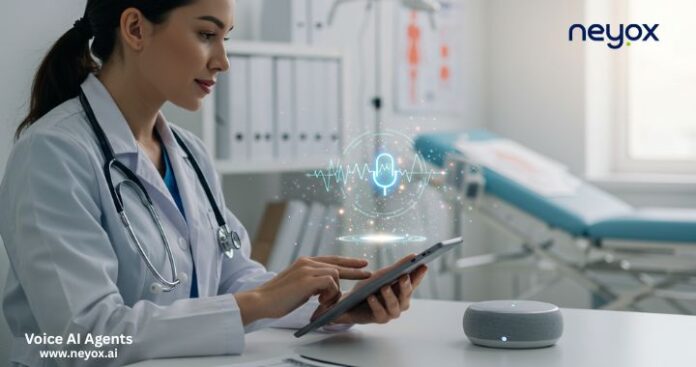Introduction to Voice AI in Healthcare
The healthcare industry has long faced challenges with documentation, from maintaining accurate patient records to managing administrative workloads efficiently. The emergence of Voice AI Agent for Healthcare is transforming the way medical professionals handle documentation, enabling a shift from time-consuming manual entry to intelligent, voice-driven solutions. By integrating advanced voice recognition and artificial intelligence, healthcare providers can streamline their workflows, improve patient care, and reduce administrative burdens.
Enhancing Efficiency and Accuracy
Traditional healthcare documentation often involves clinicians spending hours entering notes into electronic health records (EHRs). This process can be tedious and prone to human error. Voice AI Agent for Healthcare allows clinicians to dictate notes directly during patient consultations, automatically transcribing speech into structured, accurate medical records. The AI not only captures the spoken words but also interprets context, medical terminology, and relevant patient information, ensuring higher accuracy compared to manual input. This shift significantly reduces the administrative workload and allows healthcare professionals to focus more on patient care.
Improving Patient Interaction
Time spent on documentation can detract from meaningful interactions between clinicians and patients. With Voice AI Agent for Healthcare, physicians can maintain eye contact and engage more naturally with patients, as the AI handles real-time transcription and note organization. This seamless integration enhances the patient experience, fostering trust and ensuring that important details are not overlooked. By reducing the cognitive load associated with documentation, clinicians can provide more attentive and empathetic care.
Seamless Integration with Existing Systems
One of the significant advantages of a Voice AI Agent for Healthcare is its ability to integrate seamlessly with existing electronic health record systems. AI-powered solutions can connect with various platforms to automatically update patient records, retrieve relevant medical histories, and generate structured reports. This interoperability ensures that healthcare institutions do not have to overhaul their entire IT infrastructure, making adoption smoother and cost-effective. Furthermore, real-time updates and voice-driven commands facilitate faster decision-making and coordinated care among multidisciplinary teams.
Reducing Burnout Among Healthcare Professionals
Healthcare professionals face significant stress due to high workloads and extensive administrative tasks. The repetitive nature of documentation contributes heavily to burnout. By implementing a Voice AI Agent for Healthcare, hospitals and clinics can alleviate these pressures. The AI handles the transcription, formatting, and categorization of medical notes, freeing up clinicians to dedicate more time to patient care, research, or continuing education. This reduction in clerical burden directly contributes to improved job satisfaction and retention rates among healthcare staff.
Supporting Compliance and Data Security
Accurate documentation is not just about efficiency; it is also critical for legal and regulatory compliance. A Voice AI Agent for Healthcare ensures that records are consistently detailed and structured according to industry standards. Many AI agents are equipped with secure data handling protocols, including encryption and compliance with HIPAA and other regulations, protecting sensitive patient information. By reducing manual entry errors and maintaining thorough records, healthcare providers can mitigate risks associated with audits, insurance claims, and legal challenges.
Advancing Clinical Insights and Analytics
Beyond documentation, Voice AI Agent for Healthcare can contribute to broader clinical insights. The AI systems can analyze voice data and patient interactions to identify trends, flag potential health risks, and support clinical decision-making. For instance, subtle changes in a patient’s speech patterns could indicate neurological or respiratory issues, providing an additional layer of diagnostic support. This integration of voice-driven analytics with healthcare documentation creates opportunities for proactive, data-informed patient care.
Cost Efficiency and Scalability
Implementing AI-driven voice solutions in healthcare is also economically beneficial. By automating documentation, healthcare institutions can reduce the need for extensive administrative staff, cut down on transcription services, and minimize errors that could result in costly corrections. A Voice AI Agent for Healthcare can scale effortlessly to accommodate growing patient volumes, multiple departments, and even telehealth services, making it a versatile solution for modern healthcare systems.
Future Outlook
The adoption of Voice AI Agent for Healthcare is expected to grow as AI technology becomes more sophisticated and trusted in clinical settings. Future advancements may include multilingual support, predictive documentation, and even integration with wearable devices for real-time patient monitoring. As AI continues to evolve, it promises not only to enhance documentation but also to transform healthcare delivery, making it more patient-centric, efficient, and data-driven.
Conclusion
Voice AI is redefining healthcare documentation by bridging the gap between patient care and administrative efficiency. The integration of Voice AI Agent for Healthcare empowers clinicians to focus on what matters most—providing quality care—while ensuring accurate, secure, and insightful records. As the healthcare industry embraces these innovations, the potential for improved outcomes, reduced burnout, and optimized operations becomes increasingly tangible. Voice-driven documentation is no longer a futuristic concept but a practical solution that is reshaping the way healthcare professionals work and patients experience care.



